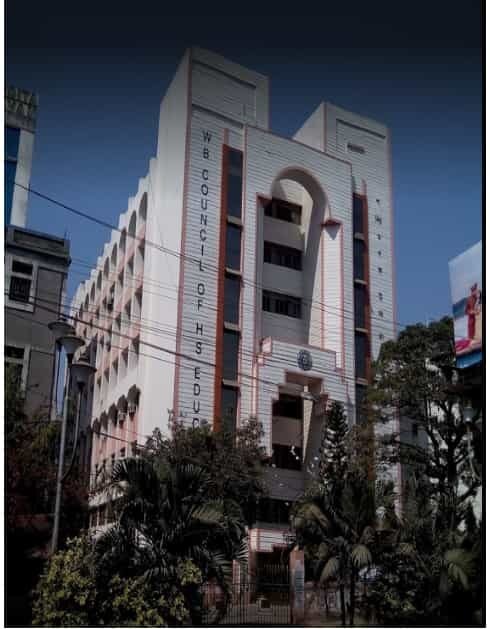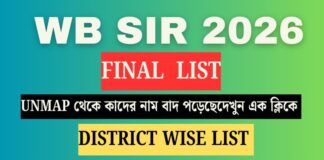This Post Contents
The West Bengal Council of Higher Secondary Education (WBCHSE) has introduced a semester-based examination system for Classes XI and XII, replacing the traditional annual exam pattern. This reform aims to reduce exam stress, ensure continuous evaluation, and improve learning outcomes. Below is a detailed breakdown of the new system.
West Bengal Higher Secondary Semester System Calculation-Click here
Implementation Timeline
- Class XI: Introduced from the 2024-25 academic session (current batch follows the semester system).
- Class XII (HS): Will be implemented from the 2025-26 academic session.
- The 2025 HS exams (held earlier this year) were the last under the annual system.
- The 2026 HS batch will be the first to follow the semester-based exams.
Class XII (HS) Semester Structure (2025-26 Onwards)
1. Semester III (First Semester of Class XII)
- Exam Dates: September 8–22, 2025
- Question Pattern: Multiple-Choice Questions (MCQs)
- Marks Distribution:
- Practical-based subjects (Physics, Chemistry, Biology, Geography, etc.):
- Theory: 35 marks
- Project-based subjects (Languages, History, Political Science, Economics, etc.):
- Theory: 40 marks
- Arts & Vocational Subjects (Music, Visual Arts, etc.):
- Theory: 20 marks (out of 50 total theory marks for the year)
- Practical-based subjects (Physics, Chemistry, Biology, Geography, etc.):
2. Semester IV (Second Semester of Class XII)
- Exam Dates: February 12–27, 2026
- Question Pattern: Short Answer Questions (SAQs) & Descriptive Questions (DQs)
- Marks Distribution:
- Practical-based subjects:
- Theory: 35 marks
- Practicals: 30 marks (conducted at the end of Semester IV)
- Project-based subjects:
- Theory: 40 marks
- Project: 20 marks (submitted at the end of Semester IV)
- Arts & Vocational Subjects:
- Theory: 30 marks (out of 50 total theory marks for the year)
- Practicals: 50 marks
- Practical-based subjects:
Key Features of the New System(West Bengal Higher Secondary Semester System)
✅ Continuous Assessment – Reduces reliance on a single high-stakes exam.
✅ Balanced Evaluation – Combines MCQs (Semester III) and descriptive writing (Semester IV).
✅ Second-Chance Opportunity – Students can improve performance across two semesters.
✅ Practical & Project Focus – Encourages hands-on learning and application-based testing.
Passing Criteria & Grading
- Minimum Passing Marks: 30% in both theory and practical/project for each subject.
- Subjects Required:
- Two language subjects (e.g., Bengali/English + another language).
- Three elective subjects (Science/Commerce/Arts stream subjects).
- Final Grade Calculation: Cumulative performance in Semester III + Semester IV.
Special Cases & Adjustments
- Health & Physical Education: 70 marks (theory) + 30 marks (practical).
- Vocational Subjects: 50 marks (theory) + 50 marks (practical).
- Music & Visual Arts: 50 marks (theory) + 50 marks (practical).
Advantages of the Semester System
✔ Reduced Exam Burden – Syllabus divided into manageable parts.
✔ Holistic Learning – Encourages regular study habits.
✔ Fair Evaluation – Tests both objective (MCQs) and subjective (writing) skills.
Challenges
❌ Frequent Exams – Some students may find multiple assessments stressful.
❌ Adjustment Period – Teachers and students need time to adapt.
Conclusion
The West Bengal Higher Secondary Semester System is a significant step toward modernizing West Bengal’s higher secondary education. By balancing MCQ-based assessments with descriptive exams, it ensures a comprehensive evaluation while reducing year-end pressure. Students appearing for the 2026 HS exams will be the first to experience this new format.

FAQs on West Bengal Higher Secondary Semester System (WBCHSE)
1. What is the West Bengal Higher Secondary Semester System?
The West Bengal Higher Secondary Semester System is a new academic framework introduced by the WBCHSE for Classes XI and XII. It replaces the traditional annual exam system with two semesters per year, each followed by exams to ensure continuous evaluation.
2. When wasWest Bengal Higher Secondary Semester System implemented?
Class XI: From the 2024-25 academic session.
Class XII (HS): Will start from 2025-26 (first semester exams in September 2025).
3. How are the Class XII (HS) exams structured under the new system?
Semester III (First Term):
Exams: September 8–22, 2025
Pattern: MCQ-based (Multiple Choice Questions)
Semester IV (Second Term):
Exams: February 12–27, 2026
Pattern: Short + Descriptive Questions
4. What are the passing criteria under the WBCHSE semester system?
Minimum 30% marks in both theory and practical/project for each subject.
Must pass five subjects (2 languages + 3 electives).
5. How are marks distributed in the new system?
Theory: Split between Semester III (MCQs) and Semester IV (descriptive).
Practical/Project: Conducted at the end of Semester IV (30 marks for practical subjects, 20 for projects).
6. Will the semester system reduce exam stress?
Yes! The syllabus is divided into two parts, and students get two chances (Semester III + IV) to improve their scores.
7. Are there any changes in subjects like Music or Vocational courses?
Music/Visual Arts: 50 marks (theory) + 50 marks (practical).
Vocational Subjects: 50 marks (theory) + 50 marks (practical).
8. How will the final HS marks be calculated?
The cumulative score of both semesters (III + IV) will determine the final grade.
9. What if a student fails one semester?
Students must pass both semesters separately in each subject to clear the HS exam.
10. Where can I get official updates about the WBCHSE semester system?
Visit the WBCHSE website (www.wbchse.nic.in) for notifications and sample papers.


![[DIRECT LINK]WB HS RESULT 2024,WB HS RESULT 2024 CHECK ONLINE,WB HIGHER SECONDARY RESULT 2024! HS_Result_2022](https://www.wbedu.in/wp-content/uploads/2022/06/HS_Result_2022-218x150.jpg)
![[DOWNLOAD-PDF] WBCHSE EXAM DATE 2025,2025 HS Exam Routine PDF,2025 HS exam routine PDF West Bengal board wbchse_exam_date_2025](https://www.wbedu.in/wp-content/uploads/2024/03/wbchse_exam_date_2025-218x150.jpg)



![[calendar] West Bengal govt calendar 2024,West Bengal Government Holiday Calendar 2024,very big good news West_Bengal_govt_calendar_2024](https://www.wbedu.in/wp-content/uploads/2023/11/West_Bengal_govt_calendar_2024-100x70.jpg)
![[Calculator]WB Primary Teachers Recruitment Weightage Calculation,WB Primary TET Weighatge Calculator 2022,very big news WB_Primary_Teachers_Recruitment_Weightage_Calculation](https://www.wbedu.in/wp-content/uploads/2022/10/WB_Primary_Teachers_Recruitment_Weightage_Calculation-100x70.jpg)
![[Download-Print]wb primary tet admit card 2023 download,wb tet admit card 2023,wb tet admit card 2023 release date 2017_tet_exam_admit_card](https://www.wbedu.in/wp-content/uploads/2021/01/2017_tet_exam_admit_card-100x70.jpg)
